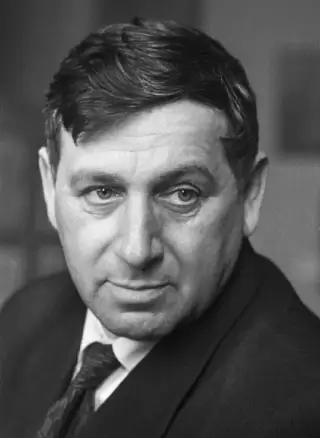Biography of Rasul Rza

| date | place | |
|---|---|---|
| born | May 19, 1910 | Goychay, Russian Empire |
| died | April 01, 1981 | Baku, Azerbaijan SSR, USSR |
Rasul Rza, born Rasul Ibrahim oghlu Rzayev on May 19, 1910, in Goychay, Azerbaijan, was a prominent Azerbaijani poet and writer. He became a significant cultural figure, recognized as the People's Poet of Azerbaijan and awarded the title of Hero of Socialist Labor in 1980. Rza was also a laureate of the Soviet State Award and served as the Chairman of the Writers' Union of Azerbaijan. Rza's early education was marked by his family's literary influence; his uncle, who had aspirations of becoming a poet, inspired him. He studied at various institutions, including the Transcaucasus Communist University and the Soviet Cinematography Institute. Rasul Rza was the Chairman of the Azerbaijan Writers’ Union (1939) and the Member of the USSR Writers’ Board (1964). His literary career began in the late 1920s, with his first poem published in Tbilisi. Rasul Rza brought a new breath to Azerbaijani literature with his innovation. His works carried inspirational, motivational, as well as thought-provoking features. He was the first Azerbaijani poet to use free verse in his poetry and was editor-in-chief of the first Azerbaijani translation of the Great Soviet Encyclopedia published in Baku. The poetry of Rasul Rza was distinguished by philosophical lyricism, the vividness of the ideas and the emotions, original poetic characters and expression devices. His philosophical poems from the series of “Rengler” (“Colours”), lyrical epic poems “Fuzuli” and “Gizilgul olmayaydi” (If only there were not a rose) are considered to be the best patterns of Azerbaijani poetry. The poet wrote numerous lyrics, most of which were set to music and sung by the prominent singers such as Rashid Behbudov, Muslim Magomayev, Mirza Babayev, Javanshir Guliyev and many others. His poems were translated into many languages in the Soviet Union period: German, French, Persian, Russian, English, as well as several Turkic languages. He is the author of over 30 books of poetry such as “Poems” (1959), “Light On My Window” (1962), “Feelings, Thoughts” (1964), “Endurance” (1965), “Yesterday, Today and Tomorrow” (1973), “Towards the Wind” (1979) and others. He also translated the literary works of such outstanding poets as Lord Byron, Alexander Pushkin, Heinrich Heine, Mikhail Lermontov, Alexander Blok, Nazim Hikmat, Federico García Lorca and many others into Azerbaijani. It must be noted that the beginning of the 20th century, the period of massive revolutions, endowed Azerbaijani literature with a new form and meaning. Rasul Rza resorted to blank verse when everybody got used to listening and reciting samples of traditional poetry. Rza's writing evolved significantly over his career. His early works during the 1930s included patriotic themes, particularly during World War II. He later adopted a more philosophical tone in the 1960s, exploring complex intellectual themes and subtly critiquing the Soviet regime, which led to periods of censorship. Notable works include lyrical poems, dramas, and prose that reflect his deep engagement with social and political issues. In addition to his poetry, Rza held various influential positions in Azerbaijani culture, including minister of Azerbaijani Cinematography from 1945 to 1948 and chief editor of the Azerbaijani Soviet Encyclopedia from 1966 to 1975. He passed away on April 1, 1981, in Baku and was buried in Fakhri Khiyaban. His legacy continues through the Rasul Rza Foundation, which honors his contributions to literature by awarding emerging writers. The following poems of Rasul Rza are brought to you in cooperation with Azerbaijan State Translation Centre
Feel free to be first to leave comment.